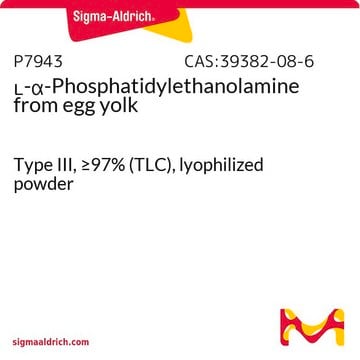P3556
L-α-Phosphatidylcholine
egg yolk, Type XVI-E, ≥99% (TLC), lyophilized powder
Synonym(s):
1,2-Diacyl-sn-glycero-3-phosphocholine, 3-sn-Phosphatidylcholine, L-α-Lecithin, Azolectin, PC
About This Item
Recommended Products
biological source
egg yolk
Quality Level
type
Type XVI-E
Assay
≥99% (TLC)
form
lyophilized powder
functional group
phospholipid
lipid type
phosphoglycerides
shipped in
ambient
storage temp.
−20°C
InChI
1S/C42H80NO8P/c1-6-8-10-12-14-16-18-20-21-23-25-27-29-31-33-35-42(45)51-40(39-50-52(46,47)49-37-36-43(3,4)5)38-48-41(44)34-32-30-28-26-24-22-19-17-15-13-11-9-7-2/h14,16,20-21,40H,6-13,15,17-19,22-39H2,1-5H3/b16-14-,21-20-/t40-/m1/s1
InChI key
JLPULHDHAOZNQI-ZTIMHPMXSA-N
Looking for similar products? Visit Product Comparison Guide
General description
Application
- to form a thin lipid film used in Kupffer cell depletion by liposome-encapsulated clodronate
- as a component of assay buffer used in γ-secretase in vitro assay
- in the preparation of substrate mix for its use in HPLC (high performance liquid chromatography) assay of 5-lipoxygenase enzyme activity
Biochem/physiol Actions
Packaging
Preparation Note
also commonly purchased with this product
Storage Class Code
11 - Combustible Solids
WGK
WGK 1
Flash Point(F)
Not applicable
Flash Point(C)
Not applicable
Personal Protective Equipment
Certificates of Analysis (COA)
Search for Certificates of Analysis (COA) by entering the products Lot/Batch Number. Lot and Batch Numbers can be found on a product’s label following the words ‘Lot’ or ‘Batch’.
Already Own This Product?
Find documentation for the products that you have recently purchased in the Document Library.
Customers Also Viewed
Protocols
(soybean), ≥97%; L-α-Phosphatidylethanolamine from egg yolk, Type III, ≥97% (TLC), lyophilized powder; L-α-Phosphatidylcholine, from egg yolk, Type XVI-E, ≥99% (TLC), lyophilized powder; Sphingomyelin, from chicken egg yolk, ≥95%
(soybean), ≥97%; L-α-Phosphatidylethanolamine from egg yolk, Type III, ≥97% (TLC), lyophilized powder; L-α-Phosphatidylcholine, from egg yolk, Type XVI-E, ≥99% (TLC), lyophilized powder; Sphingomyelin, from chicken egg yolk, ≥95%
(soybean), ≥97%; L-α-Phosphatidylethanolamine from egg yolk, Type III, ≥97% (TLC), lyophilized powder; L-α-Phosphatidylcholine, from egg yolk, Type XVI-E, ≥99% (TLC), lyophilized powder; Sphingomyelin, from chicken egg yolk, ≥95%
(soybean), ≥97%; L-α-Phosphatidylethanolamine from egg yolk, Type III, ≥97% (TLC), lyophilized powder; L-α-Phosphatidylcholine, from egg yolk, Type XVI-E, ≥99% (TLC), lyophilized powder; Sphingomyelin, from chicken egg yolk, ≥95%
Our team of scientists has experience in all areas of research including Life Science, Material Science, Chemical Synthesis, Chromatography, Analytical and many others.
Contact Technical Service








